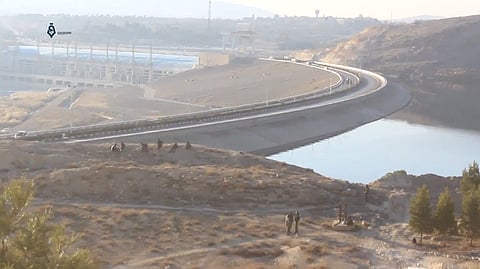

In a significant development for Syria’s post-Assad landscape, the Syrian government and the Kurdish-led Syrian Democratic Forces (SDF) have brokered an agreement over the strategic Tishreen Dam in Aleppo’s countryside.
This deal aims to quell escalating clashes between the SDF and Turkish-backed factions vying for control of this vital hydroelectric and irrigation asset. The accord reflects broader efforts to stabilize Syria amid competing regional and international interests.
The agreement stipulates that Syrian Arab Army forces and security units will deploy to the Tishreen Dam to ensure stability, as reported by Syria’s state news agency SANA:
Syrian Arab Army forces and security forces entered into the Tishreen Dam to impose security in the region, under the agreement reached with the SDF.
SANA news agency
A joint force will reportedly protect the dam, with Turkish-backed groups — now partially integrated into Damascus’ armed forces — required to withdraw to avoid undermining the deal.
This follows heavy fighting since December 2024, when Bashar al-Assad’s government collapsed, leaving a power vacuum exploited by rival factions.
Despite the SDF’s military withdrawal, Kurdish civilian administration of the dam remains intact, according to a Kurdish source cited by AFP. This provision underscores the SDF’s determination to retain influence over critical infrastructure in northeastern Syria, even as it negotiates integration into state institutions.
The deal builds on a March 2025 agreement between interim President Ahmad al-Sharaa and SDF commander Mazloum Abdi, which promised to incorporate Kurdish-controlled entities — such as border crossings and oil fields — into the national framework while guaranteeing equal participation for all Syrians.
The agreement’s success hinges on navigating Turkey’s complex role.
Ankara, a key backer of the new Syrian government, has long opposed the SDF, viewing it as an extension of the outlawed Kurdistan Workers’ Party (PKK).
Turkish air support bolstered factions clashing with the SDF over the dam, and Ankara is now reportedly establishing new military bases to train Syria’s reconstituted army.
This raises questions about whether Turkey will honor the deal’s call for its proxies to stand down, especially given the incorporation of former Syrian National Army factions — some with ties to extremist groups like Jaish al-Islam — into Damascus’ forces.
The Tishreen Dam accord represents a tentative step toward de-escalation, but its durability remains uncertain.
Integrating the SDF into a Syrian army alongside former adversaries poses logistical and ideological challenges. Moreover, Turkey’s strategic ambitions and the US-led coalition’s oversight of the deal add layers of external influence.
For now, the agreement offers a reprieve for a war-torn region, but lasting peace will require reconciling Syria’s fractured political and military landscape.